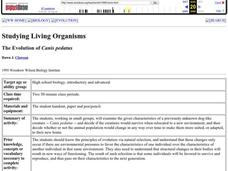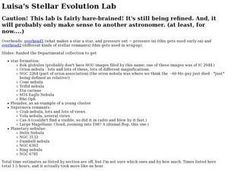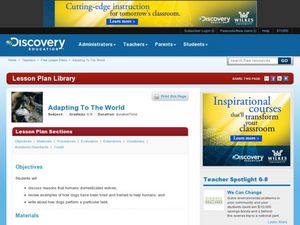Curated OER
Word Adaptation
Seventh graders differentiate evolution and adaptation. In this biology activity, 7th graders make new words from a given word by adding or changing a letter. They set up a T-chart and enumerate how adaptation is like or unlike evolution.
Curated OER
Primate Characteristics and Exaptation
Students compare the features of gorilla to humans. In this biology lesson, students simulate adaptation using materials found in the classroom. They explain what exaptation means.
Curated OER
The Evolution of Canis pedatus
Students examine the given characteristics of a previously unknown dog-like creature, Canis pedatus, to decide if the creatures would survive when relocated to a new environment. They work in small groups to decide whether or not the...
Curated OER
The Evolution of Canis pedatus
Young scholars, in groups, examine the given characteristics of a previously unknown dog-like creature, Canis pedatus. They discuss whether or not this species would show adaptations and survive if it were relocated to a new environment.
Curated OER
Luisa's Steller Evolution Lab
Students examine stars and constellations in the night sky. They complete a KWL chart and calculate the mass of stars. They also discuss how a star is formed.
Curated OER
What Killed the Dinosaurs?
Young scholars demonstrate how scientists use evidence to formulate hypotheses. They write an essay describing the Cretaceous and Paleocene time periods from the point of view of someone living in that time. In addition, they formulate...
Curated OER
Blocks And Screws (or "screwy Contrivances")
Students, given a block of wood and a screw or nail, are asked to put that screw or nail into a block. They examine how many contrivances and other imperfections found in living things are best explained by the process of evolution.
Curated OER
Build a Bug
Students design an ideally adapted macroinvertebrate to live in a water habitat. They illustrate their animal, name it and specify the adaptations it has that enable it to survive.
Curated OER
A Tree Full of Ancestors
Students study human evolution and the scientific process. They complete the Origins of Humankind Web activity to become familiar with the hominid species as well as the associated evidence found, in the form of fossils and artifacts.
Curated OER
Evolution
Students investigate the concept of evolution and its implications upon the origin and development of life. They conduct research using a variety of resources while focusing upon cross-over and mutations. The information is used to set...
Curated OER
Natural Selection and the Peppered Moth
Learners study natural selection and its process in the peppered moth. In this evolution lesson plan, students read about the concept of natural selection as suggested by Charles Darwin. Learners then complete a natural selection...
Curated OER
Hertzsprung-Russell Diagram
Students examine the relationship between temperature and brightness. In this astronomy lesson students will correlate the evolution of stars to the HR diagram plotted.
Curated OER
13 Ways to Tell Time Backwards
Students explore different ways geological time can be measured: comparing the time dimensions for each method, the mechanisms of each method, and the materials used.
Curated OER
The Right Tool for the Job: Fishing Tools and Technology
Pupils use modern technology to research the history, design, and function of a specific tool or piece of fishing technology. They create a timeline and story about the evolution of the tool.
Curated OER
Why Do We Need Vitamin C in Our Diet?
Students compare/contrast the DNA sequence data of the rat GULO gene to the inactive human GULO gene. They translate and align the sequences, and propose a scenario to explain the occurrence of an inactive DNA sequence to that of an...
Curated OER
Evolution
Students illustrate the results of natural selection by identifying the specific adaptation of an organism that allows the species to survive in that environment. They illustrate the results of natural selection by recognizing examples...
Curated OER
Creative Ways To Teach Evolutionary Concepts
High schoolers explore evolutionary concepts in cartoons and lab activities. They describe and explain evolutionary concepts featured in a cartoon and participate in laboratory activities.
Curated OER
Exploring the Uses of Beaks
Young scholars explore the uses of bird beaks in the wild by participating in experiment stations. In this bird adaptation lesson, students work in groups and complete experiment stations that represent different types of bird beaks....
Curated OER
Inspired Science
Students explore the history of inventions and their difference from discoveries. They create timelines of inventions, demonstrating their connections to each other.
Curated OER
The Opposable Thumb
Pupils explore the physical importance of the opposable thumb among primates. They discover which of their simplest daily activities are possible only because of their opposable thumbs.
Curated OER
Physics at the Zoo
Students visit a local zoo and answer physics questions that are a part of zoo life. In this zoo physics lesson students answer questions that have to do with the physics of animal size, their center of gravity and how animals travel.
Curated OER
Adapting to the World
Middle schoolers consider dog breeds that are helpful to humans and their hereditary link to wolves. In this biology instructional activity, student research a dog breed for traits that make it useful to humans. Students write a...
Curated OER
Judges in the Classroom
Students define the legal meaning of juvenile and identify various ways to treat young offenders. They identify the current philosophy of the Utah juvenile justice system using a true/false worksheet and discussion format.
Curated OER
Justice Demands an End to Segregation, But it Does Not End
Students define human rights and describe how it applies to politics, economics and cultural rights. As a class, they watch a video how the Constitution was made and discuss its purpose. In groups, they present information to the class...

























